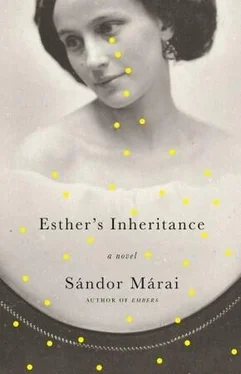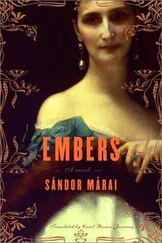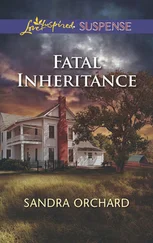“But I have read the letters,” she retorted in a matter-of-fact way.
Now I fell silent. We looked at each other.
“What letters?” I asked, astonished.
“The letters, Esther,” she sharply retorted. “Father’s letters, the ones he wrote to you at the time. You know, when he used to visit the house, when he was obsessed with you, saying that you should run away together because he couldn’t go on otherwise, could no longer keep up appearances, that he couldn’t cope with Vilma, who was stronger than he was and who hated you, Esther…because Mother did hate you…. Why? Because you were younger? Or more beautiful, or more real? Only you can answer that.”
“What are you talking about, Éva,” I cried, and shook her by the arm. “What letters? What is this nonsense?”
She freed her arm, stroked her forehead with her gentle childlike hands, and stared at me with big wide eyes.
“Why are you lying?” she asked, her voice cold and hard.
“I have never lied,” I answered.
She shrugged.
“I have read the letters,” she said, and folded her arms like a magistrate. “They were lying in the cupboard for ages, in the cupboard where Mama kept her underwear, where you hid them — you know, in that rosewood box…It is hardly three years since I found them.”
I felt myself going pale, the blood draining from my face.
“Tell me what they say,” I demanded. “Think what you like, think me a liar, but tell me everything you know about those letters.”
“I don’t understand,” she said sharply, now that it was her turn to be surprised. “I am talking about the three letters that Father wrote you when he was engaged to Mama, begging you to release him from his emotional prison, because he loved only you. The last letter was dated just before the wedding. I compared the dates. It’s the letter where he writes that he can’t speak to you directly because he hasn’t the strength and is ashamed on account of Mama. I don’t think Father has ever written a more sincere letter. He writes that he is a crushed, injured man, that he trusts only you, that only you can give him back his self-respect and sanity. He begs you to elope with him, to abandon all else, to go abroad with him; that he puts his life into your hands. It is a letter of despair. It is impossible that you should not remember it, Esther. It is impossible, isn’t it? For some reason you don’t want to discuss these letters with me…maybe they are painful on account of Mama, or you simply want to hide the whole thing from me. I understood everything once I read these letters. I saw my father in quite a different light from that time on. It’s enough that once in one’s life one should strive to be strong and good. It wasn’t his fault that he failed. Why didn’t you answer?”
“What should I have answered?” I asked, in the same flat, indifferent voice anyone might use in admitting that they had lied, and if I had genuinely known of these letters.
“What?…My god! You should have answered something. These were the sort of letters people get just once in a lifetime. He wrote that he would wait till the morning for your answer. If you did not answer he would know you lacked the strength…in which case he had no choice but to remain here and marry Mama. But he couldn’t speak to you about this. He was afraid you would not believe him because he had often lied before. I cannot know what happened between you…I don’t even have any right to ask. But you did not answer his letter, and soon everything went terribly wrong. Don’t be cross, Esther…now that it is all over I think you were partly responsible for what happened.”
“When did your father write those letters?”
“The week before the wedding.”
“Where did he address them?”
“Where? Here, home, to your house. You lived here then together with Mama.”
“You found them in a rosewood box?”
“Yes, in a box, in the cupboard where the underwear was kept.”
“Did anyone have a key to that cupboard?”
“Only you. And Father.”
What could I have answered? I let go of her arm, stood up, went over to the sideboard, and picked up Vilma’s portrait and gazed at it a while. It had been a long time since I had held the picture in my hands. Now I stared at those familiar and yet terrifyingly strange eyes and suddenly I understood.
M y sister Vilma hated me. Éva was right, there had been bad blood between us for as long as I can remember, a nameless dark fury the reasons for which had disappeared over the years. Nothing can explain this mutual hatred — for the fact is that I hated her as much as she did me — nor did either of us ever seek to explain it. I cannot be more precise in specifying whether this or that act of hers did the damage; she would have said something different anyway, and that was why we were so much against each other. She was always the stronger, even in matters of hatred. If someone were to have asked her why she hated me so relentlessly, she could have spat out a long list of accusations complete with reasons, but none of them would have explained the hatred. We put aside the excuses. There remained the fury, the hot thick feeling that floods every inch of the human landscape with its muddy slime, and when Vilma died there were no family ties left, only a blank floodplain of hatred.
I held the picture close to my nearsighted eyes and examined it carefully. How strong the dead are! I thought helplessly. At that particular moment Vilma was alive in a mysterious form of being that the dead assume when they want to intervene in our lives, the dead whom we believe are buried under mounds of earth and bound by the chains of decay. But come the day, and they appear and act. Maybe this is that day, Vilma’s day, I thought. And I remembered the afternoon when she was dying, when she could only recognize what was around her for a few seconds at a time, when I was weeping at her bedside, waiting for her to speak, to bid farewell or pronounce a word of reconciliation, all the while knowing that I hadn’t forgiven her, not even then, on death’s threshold, any more than had she in her swoon of death forgiven me. I covered my face with my hands and wept. And then she spoke. You’ll think of me yet, said she, no longer in her right mind. She has forgiven me! I thought, hoping it might be so. But what I secretly felt was, She is threatening me. And then she died. After the funeral I stayed in the apartment for months. One couldn’t leave the children alone to fend for themselves. Lajos traveled abroad and was away for a few months. I stayed in the empty apartment waiting for something.
But as for Vilma’s cupboard, that particular cupboard where Éva was later to find the letters, I never once opened it. If someone were to ask why, I might give the righteous answer, proclaiming in ringing words that I had no right to meddle in the affairs of the dead. The truth is I was a coward. I was afraid of what might be in the cupboard, afraid of the memory of Vilma. And that was because, having died and therefore unilaterally brought an end to our eternal passionate dialogue and concluded the quarrel between us, she seemed to have placed any memory we might have shared, any ambition or temper we might have had in common, under a peculiar ban. Lajos went away after the funeral and I lived there with the children in an apartment where nothing belonged to me and yet everything had been partly stolen from me, where all useful items seemed to have been stamped by some mysterious executor — at that stage it was only the presence of executors of that kind we detected in the apartment, the real, the everyday, the official executors appearing only later, bearing bills for Lajos’s debts — that was where I ran the household without daring to touch anything, feeling it was not mine, and where I brought up the children more timidly than any professional governess. Everything in the apartment was against me, everything under ban, everything exuded the strange, hostile quality that determines one’s deeper sense of what is mine and what is yours in life. Nothing that remained here was mine. Vilma took it all with her, everything I would have wanted; she ruined everything, forbade everything I desired. She ruled over us with the despotic power only the dead can exercise. I put up with it for a while. I was waiting for Lajos, waiting for a miracle.
Читать дальше












